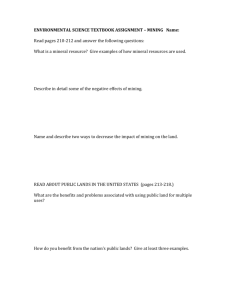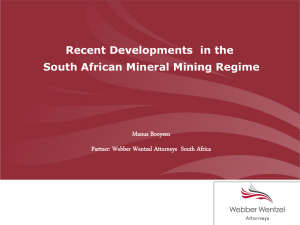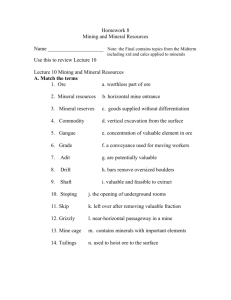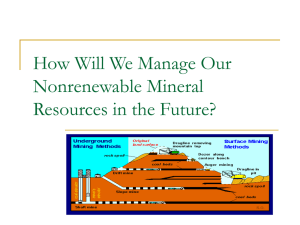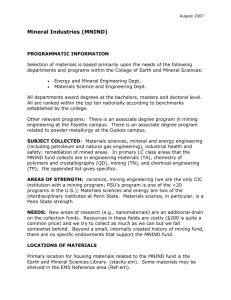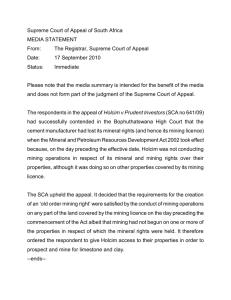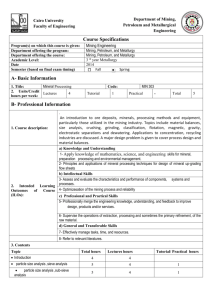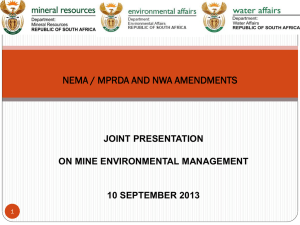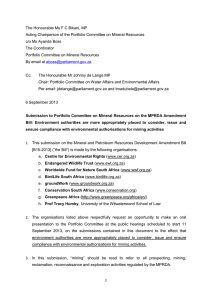national environmental management laws amendment bill, 2013
advertisement
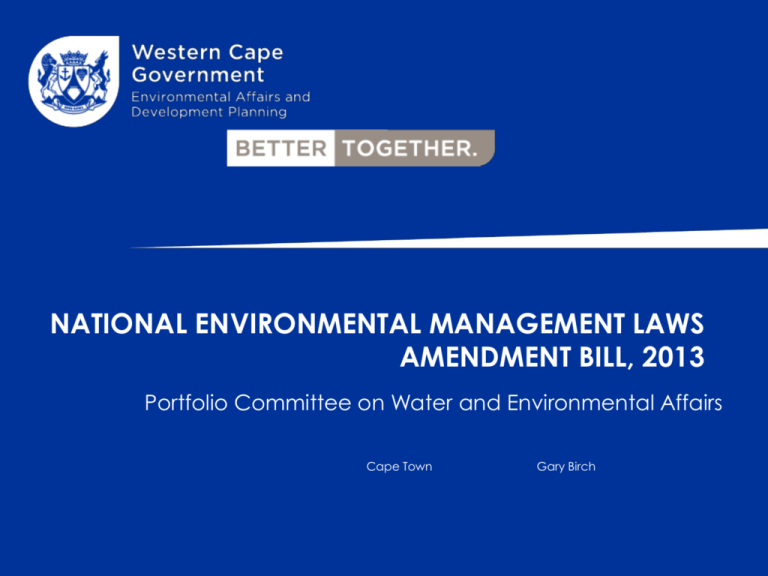
NATIONAL ENVIRONMENTAL MANAGEMENT LAWS AMENDMENT BILL, 2013 Portfolio Committee on Water and Environmental Affairs Cape Town Gary Birch The 2008 agreement National Environmental Management Amendment Act, 62 of 2008 • Enacted and assented to on 5 January 2009. Mineral and Petroleum Resources Development Amendment, Act 49 of 2008 • Enacted and assented to on 19 April 2009 but only came into operation on the 7th of June 2013. Allowed for a three phased approach • The first 18-month period commences (7 June 2013 - 8 December 2014): Status quo remains - separate processes and separate decisions for environmental provisions in NEMA and MPRDA • Interim phase (second 18-month period commences [8 December 2014 - 8 June 2016]): The Minister for Mineral Resources will become the competent authority in terms of the EIA Regulations for a period of 18 months after the date of commencement of the MPRDA Amendment Act, 2008 (8 December 2014), with the Minister of Water and Environmental Affairs being the appeal authority for the provisions relating to prospecting, mining, exploration, and production and related activities. • The third phase (ongoing): The Interim phase will be effective for 18 months before reverting to the relevant environmental authorities. In other words, 36 months from the 7 June 2013 the authority to take first-instance decisions on applications for NEMA authorisations will revert back to the environmental authorities. © Western Cape Government 2012 | The 2008 agreement (cont.) Proposed amendment in terms of clause13 and 14 of the National Environmental Management Laws Amendment Bill, 2013 repealing section13 and section 14 of the National Environmental Management Amendment Act, 62 of 2008 terminates the third phase. The deletion of the third phase, which will allow the Minister of Mineral Resources (DMR) to retain the decision-making authority to issue environmental authorisations in terms of NEMA for prospecting, mining, exploration, production and related activities, is not supported. © Western Cape Government 2012 | 3 Key Issues The Western Cape Department of Environmental Affairs and Development Planning (the Department) does not support the transfer of environmental decision making competencies (in terms of NEMA) to the Department of Mineral Resources The definition of ‘sustainable development’ in the Mineral and Petroleum Resources Development Act, 28 of 2002 (MPRDA) currently reads “means the integration of social, economic and environmental factors into planning, implementation and decision making so as to ensure that mineral and petroleum resources development serves present and future generations”. The definition of ‘sustainable development’ in the National Environmental Management Act, 107 of 1998 (NEMA) currently reads “means the integration of social, economic and environmental factors into planning, implementation and decision-making so as to ensure that development serves present and future generations”. The NEMA calls for sustainable development, the Mineral Petroleum Resources Development Act, 2002 (MPRDA) calls for sustainable mineral development. As such, the objects of the MPRDA, read with the definition of sustainable development contained in the MPRDA, the Minister will not be able to, in an unbiased and objective manner administer the NEMA, which calls for sustainable development (i.e. interpreted broader than in the MPRDA) encompassing the most sustainable land use option as opposed to the MPRDA’s call for the most sustainable mining option. © Western Cape Government 2012 | 4 Key Issues Vision of the Department of Mineral Resources (DMR) • enables a “globally competitive, sustainable and meaningfully transformed minerals and mining sector to ensure that all South Africans derive sustainable benefit from the country’s mineral wealth”. • DMR promotes and regulates both minerals and mining to achieve this. Vision of the Department of Environmental Affairs (DEA) • to ensure the protection and conservation of natural resources, balanced with sustainable development and equitable distribution of benefits derived from natural resources”. • to achieve this DEA coordinates and monitors the implementation of national environmental policies, programmes and legislation. Section 24 of the Constitution • confers an onus on government to ensure protection of the environment • confers a right to all citizens to an environment not harmful to health and well being • obliges government to hold the environment in trust, and ensure that it is protected, for benefit of present and future generations © Western Cape Government 2012 | 5 Key Issues Principles of NEMA, inter alia, provide that : • pollution and degradation of the environment be avoided and where not possible that it be minimized and remedied • development is to be socially, environmentally and economically sustainable. • development, use and exploitation of renewable resources and the ecosystems of which it is part, may not exceed a level beyond which their integrity is jeopardised. Environmental impact of mining activities has grave consequences on the environment South Africa relies heavily on the extraction of mineral resources to ensure an economic benefit for all It would be bad governance and contrary to the principles set out above if Department of Mineral Resources whose primary function is to ensure the development and growth of the mining industry, is tasked to assess mining activities which may lead to the environmental degradation and ecological unsustainability of an activity which in essence they are mandated to promote. © Western Cape Government 2012 | 6 Key Issues It would be contrary to streamlining environmental management for environmental authorisations if processed by different departments, depending on industry, as opposed to the departments tasked with the management of environmental affairs for the country as a whole. Provisions allowing for environmental authorities to ultimately (ito the 3rd phase) have competency in respect of environmental authorisations for mining activities was the result of careful planning and a long consultation process to ensure cohesive environmental management in South Africa. Proposed competency too wide: • Definition of “mining area” proposed in the MPRD Amendment Bill too wide • DMR would be competent authority wrt specific listed activities in NEMA • DMR would be competent authority wrt associated activities The Department firmly supports the requirement for improved coordination and integrated regulatory processes, procedures and decision making. However, a call for integration and coordination does not call for a transfer of mandates. © Western Cape Government 2012 | 7 Key Issues It is anticipated that the transfer of environmental decision making mandates will result in increased appeals. To ensure integrity of environmental impact assessment process is not compromised, the Department remains of the view, and expressed this view throughout the processes currently tabled at Parliament to amend the NEMA and the MPRD Amendment Bill, that the competent authority to issue an environmental authorisation should vest solely with the environmental authorities, and that includes the authority to authorise activities related to prospecting, mining, exploration and production activities. Allowing the DMR to retain decision-making authority to issue environmental authorisations will be a gross conflict of interest and will most certainly lead to numerous decisions being reviewed owing to perception of bias which this position creates. Application for environmental authorisation is not a hindrance to development or an obstruction to job creation but rather a means to ensure an ecologically sustainable future for all South Africans is fulfilled and a means to achieve this is to ensure all appropriate checks and balances are met. © Western Cape Government 2012 | 8 Additional comment Clause 4 [Amendment of section 24O(3)] • Unclear why the time period within which State departments consulted must comment was reduced from 40 days to 30 days. • Issues: – Increased administrative burden; – The Promotion of Administrative Justice Act, 3 of 2000 provides for 30 days as a minimum to consult; – Commenting authorities already experiencing challenges in meeting the current 40 day commenting period; – With all administrative processes included, effectively only 20 days; and – Unrealistic and inappropriate. • Recommendation: – The current commenting period of 40 days should be retained for State departments. © Western Cape Government 2012 | 9 Summary It is not in the best interest of environmental management to transfer decision making competencies in terms of NEMA to the Minister of Mineral Resources: • Conflicting mandates • Unable to objectively fulfil environmental mandate • Increase in challenges to environmental decisions and appeals which will halt development • Duplication of functions and resources –without any reason to do so • The Department fundamentally disagrees with the Minister of Mineral Resources retaining the decision-making competency to process environmental authorisations for mining and associated activities. Recommendations: • Section 13 of the National Environmental Management Act, 62 of 2008, must be retained and should not be repealed. • Commenting period for State departments must remain at 40 days. Please refer to detailed written comments submitted. © Western Cape Government 2012 | 10 Contact Us Gary Birch Directorate: Environmental Governance Tel: +27 (0)21 483 4041 Fax: +27 (0)21 483 Gary.Birch@westerncape.gov.za www.westerncape.gov.za
